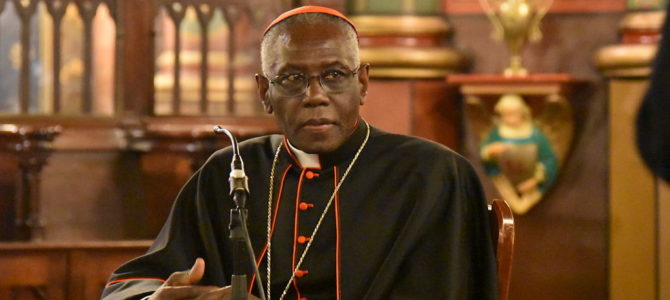I once asked George Weigel, author of the magnificent biography of Saint John Paul the Great, “Witness to Hope,” if Cardinal Wojtyla, who became Pope John Paul II in 1978, was ever aware he might one day lead the Catholic Church. Weigel, standing on the speaker’s balcony of the U.S. Capitol, gazing down the Mall at a setting sun, replied, “He didn’t have a political bone in his body.”
Weigel’s insight here is an important reminder that the Catholic Church operates according to a set of dynamics quite different from Washington, D.C. It is well to keep this in mind as we reflect on the dismissal of Cardinal Robert Sarah as head of the Vatican’s Congregation for Divine Worship and the Discipline of the Sacraments.
Cardinal Sarah, a native of Guinea, Africa, submitted to Pope Francis his pro forma resignation upon turning 75 last year. On Feb. 22 – eight months later – the pope accepted his resignation. There is no requirement that the pope accepts such a pro forma resignation, and Cardinal Sarah had indicated his willingness to continue serving in his post. (It took Pope Benedict, for example, 10 months to accept the disgraced Theodore McCarrick’s resignation.)
Sarah’s dismissal was the Vatican equivalent of next-day delivery. He was, in fact, dismissed. Sarah’s orthodoxy invites suspicions of a continuing purge by the Holy Father of opponents to his project.
Yes, Cardinal Sarah was not a fan of certain liturgical innovations. It’s also true he suffered controversy when early last year, Pope Emeritus Benedict requested his name be removed as co-author to a book they had worked on together, “From the Depths of Our Hearts.”
The book was a message of hope to priests in these dark times and a robust defense of priestly celibacy at a time some in the Vatican were conspiring to change those rules. Still, the above is too ready an explanation.
In person, Sarah conveys the persona of a deeply holy and spiritual man – gentle, yet of immense courage and rock-solid faith. His departure will deprive the church’s central governing body, the Roman Curia, of an unapologetic defender of the faith, suspicious of theological innovations.
Yet, the greater loss to the Curia may be the perspective of a man from the developing world, one who understands what the faith has to offer there. There now remains only one other African at the highest levels of the church’s Roman hierarchy, Cardinal Peter Turkson, and only three others from outside the First World. If the church has become sclerotic in Europe and is in the throes of a deep crisis in America, its source of vitality will be outside those continents, particularly in Africa and Asia.
The loss of position will not silence Sarah when he feels it necessary to speak, any more than it silenced Cardinal Burke. If he has energy left to continue, and one supposes he does given his willingness to remain at his post after reaching age 75, Cardinal Sarah’s greatest impact going forward may be back in his native Africa. The cardinal is an inspirational figure to Catholics there, particularly priests and bishops.
He was once the youngest bishop in the world. He loves the church, and can explain its faith; he will instill courage, devotion, and perspective to the next generation of church leadership. God willing, he will help Africa avoid the colossal errors of theological innovation from which Latin America has yet to recover, and where the evangelical church is now devouring a Catholic lunch.
Cardinal Sarah tweeted that his resignation had been accepted. In it, he states “the only rock is Christ.” Sarah lost his Vatican job, yet his greater service to the church might well be yet to come. The only rock is Christ, and Cardinal Sarah is his servant.









